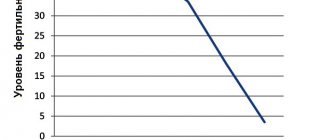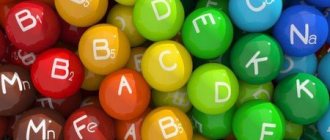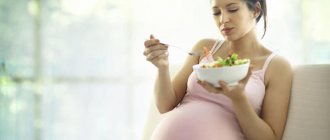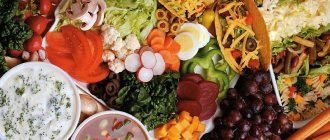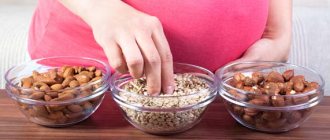Nutrition plays an important role not only during pregnancy, but also determines the success of conception. Therefore, those wishing to become pregnant should adhere to the doctor’s nutritional recommendations.
Nutrition must be correct, that is, not only balanced in composition, but also composed taking into account the influence of products on the reproductive function of women and men. In this case, we can say that nutrition is a therapeutic diet. The diet is in no way for weight loss (provided that your weight is not critically different from the norm), but a diet for normalizing metabolic processes in the body.
General rules
A child is the material embodiment of love between a man and a woman. And the parents’ first wish is that he be healthy. However, one desire is not enough; it is necessary to carefully prepare for its birth. One of the strategies of a modern family is a carefully planned and well-prepared pregnancy , and more and more modern couples are aware of the need to plan it.
Proper preparation for pregnancy should begin with a comprehensive examination of the body of future parents 5-6 months before conception, since the examination may reveal problems that require time to eliminate. For those planning a pregnancy, this process is extremely important, even if it seems to you that you are absolutely healthy, since the absence of clinical symptoms of a disease is not a true indicator of health, and most complications during pregnancy can be prevented by proper preparation for it - diagnosing possible hidden diseases, correcting vitamin / minerals, such as iodine deficiency, predispositions and conditions.
It is especially important to exclude hidden sexually transmitted diseases, persistent viral and urogenital infections, lipid metabolism disorders, determine the presence of antibodies to rubella/chickenpox and, in their absence, vaccinate, it is advisable to get vaccinated against influenza, determine the Rh factor, sanitize all identified foci of chronic infection , adjust body weight. If necessary, consultation with a geneticist is necessary. In some cases, it is necessary to cleanse the body of toxins and waste .
The full development of a child is determined by a number of factors, and proper nutrition before pregnancy is one of them. However, many believe that a balanced diet when planning pregnancy is sufficient. Unfortunately, even a balanced diet during this period cannot ensure that a woman’s body receives sufficient amounts of certain vitamins/minerals.
It is the deficiency of micronutrients before conceiving a child that can cause disturbances in the formation of the fetoplacental system , the formation of the neural tube, organs and tissues of the fetus, which determines the further negative course of pregnancy.
As such, there is no diet to get pregnant; rather, it is necessary to talk about adjusting the diet, taking into account the influence of micronutrients on the reproductive functions of women and men.
Nutrition for a man to conceive a child
Male fertility (the ability to fertilize a female egg) is determined primarily by the quality (shape, motility) and quantity of sperm. To increase fertility, men need 3-4 months before conception:
- Give up bad habits (smoking, alcohol abuse).
- Maintain moderate/regular physical activity and avoid overheating of the testicles.
- Have regular sex life with one partner (2 times a week). For conception, the optimal time interval between sexual intercourse is 2-3 days, since it is necessary for the full “maturation” of sperm and improvement of sperm quality. With prolonged sexual abstinence, the number of sperm increases, but quality indicators (motility) deteriorate.
- Adjust your diet. First of all, the diet must contain a sufficient amount of animal/vegetable protein, found in meat, fish, cottage cheese, chicken eggs, nuts, seeds, and soy.
- When preparing for conception, it is important to have lean red meat (beef, pork) and rabbit meat in the diet, containing the amino acid L-carnitine , which stimulates the development of sperm, increases their number/motility, and helps reduce atypical forms.
- For a man, it is extremely important to have a sufficient amount of micronutrients in the diet - folic acid , polyunsaturated fatty acids, vitamins C , B , E , vitamins, microelements (selenium, zinc).
- Vitamin E is an essential micronutrient that shapes male fertility and sexual function. With its deficiency, the number of immature cells in sperm increases, which reduces the chances of conception. The minimum daily dose is 10-15 mg, it can be obtained by eating 50-100 g/day of nuts (almonds, walnuts, hazelnuts), buckwheat/oatmeal, cold-pressed vegetable oil, eggs, legumes, grain bread, sprouted wheat grains.
- Vitamin C is a strong antioxidant . The daily dose for men is 100 mg. With its deficiency, sperm production decreases. The daily requirement is covered by: 250 g of citrus fruits, 20 g of rose hips, 100 g of parsley/dill, 150 g of red pepper, 120 g of kiwi.
- B vitamins - participate in the processes of hormone , increase the motor activity of sperm and the ability to penetrate the egg. Sources include meat, dairy products, eggs, grains.
- Selenium - prevents damage to biological membranes by free radicals , promotes sperm renewal. Selenium is found in seafood, milk, garlic, liver, and fish.
- Zinc is a component of all major enzymes, normalizes hormonal levels, stimulates the production of testosterone , which controls the process of sperm synthesis. Contained in walnuts, buckwheat, pumpkin seeds, cheese, oatmeal, beans, wheat bran.
In principle, the more complete a man’s diet, the higher the quality of the sperm and the higher the chance of fertilization. The diet should include more lean meat, fresh vegetables/fruits, sea/river fish, whole grain cereals, dairy products, cheese, seeds, nuts, sprouted wheat grains, liver, and seafood. At the same time, it is necessary to exclude solid animal fats, canned food, fast food, mayonnaise, smoked meats, and products containing chemical additives and caffeine from the diet.
Nutrition for men
Men who have increased body weight should pay special attention to their diet, since adipose tissue converts the male sex hormone testosterone into female sex hormones - estrogens , which reduces the potency and fertility of men (sperm volume/sperm concentration decreases and the number of atypical forms increases). To correct body weight, it is necessary to additionally exclude/limit foods containing simple carbohydrates from the diet: sweets, sugar, ice cream, jam, cakes, white bread, baked goods. To improve spermatogenesis, men are recommended to take the drug Speroton .
Nutrition when planning pregnancy for women
Since the main burden during pregnancy falls on the woman’s body, the nature of her nutrition during the period of preparation for pregnancy is extremely important. First of all, she needs to bring her body weight to the physiological norm, since optimal body weight increases the chances of becoming pregnant. Accordingly, women with low body weight should increase the energy value of the diet, since with a lack of body weight, the ovulation process suffers, and in the presence of “excess” weight, the calorie content of the diet is reduced mainly by limiting simple carbohydrates and animal fats.
In fact, adipose tissue is an additional “endocrine organ” because it has a hormonal function - it produces hormones, mainly estrogens , which causes hormonal imbalance and can cause the lack of quality ovulation and even menstrual irregularities. infertility in 6% of cases . In addition, in women with increased body weight, the risk of miscarriages in the first trimester, the development of gestational diabetes , hypertension , the appearance of edema , and the contractile activity of the uterus may be impaired.
Secondly, during the period of preparation of the body for pregnancy, it is important to eliminate the deficiency of microelements, since both problems with conception and disruption of the process of laying the fetal organs, which occur precisely in the initial period of pregnancy, can arise. To normalize weight, low-calorie nutrition, increased physical activity and lifestyle changes are recommended.
However, we should not forget that during this period you cannot use various mono- and express diets for the purpose of losing weight, since these are, as a rule, extremely unbalanced diets, the use of which can be harmful. It is recommended to reduce weight gradually (no more than 1 kg per week) and under the guidance of a nutritionist/endocrinologist with experience in reducing excess body weight in order to normalize reproductive function.
When preparing a woman for pregnancy, the diet should be balanced in all major macronutrients, primarily in protein content, especially of animal origin (veal, chicken, beef, turkey, eggs, cottage cheese) since it is the main “building” material of the tissues and organs of the fetus .
Particular attention should be paid to the inclusion in the diet of products containing the most important micronutrients for conceiving and bearing a child, which should be considered as a mandatory component of the diet of women in the period of preparation for conception - folic acid , iodine, calcium, magnesium, manganese, vitamins A , C , E , group B.
- Folic acid is an essential element during pregnancy planning. Reduces the risk of miscarriage, promotes normal formation of the neural tube and the development of the child’s nervous/cardiovascular system, is necessary for fetal growth, and is involved in cell division. Recommended dose 400 mcg/day. Contained in citrus fruits, nuts, green salad, legumes. Moreover, it is recommended to start taking additional folic acid supplements to minimize the risk of developing malformations already in the period of preparation for pregnancy and continue in the first trimester.
- Iodine - iodine deficiency has a detrimental effect on the formation of the nervous system of the embryo and is necessary for the normal function of a woman’s thyroid gland. To compensate for the lack of iodine, it is necessary to include iodine-containing foods in the diet - sea fish, figs, and various seafood. When planning pregnancy, the daily iodine intake should be 0.2 mg.
- Vitamin A - during pregnancy planning is necessary for the normal functioning of the reproductive system, and during pregnancy - for the formation of the placenta. The recommended dose is up to 3000 IU/day. Contained in fish oil, carrots, pumpkin, tomatoes, red fish.
- Vitamin D is important for the normal function of the female reproductive system and the growth of the fetal skeletal system. Contained in the yolk of chicken eggs, fish oil, hard cheeses, caviar, and butter. The daily norm is 400 IU. It is forbidden to exceed the daily norm, since vitamin D accumulates in the body and can be harmful to the formation of the fetus.
- Vitamin C is necessary for the formation of connective tissue in the fetus and strengthening the walls of blood vessels. Its deficiency increases the risk of rupture of membranes. Contained in vegetables, garden herbs, citrus fruits, lettuce peppers, currants, rose hips.
- B vitamins - found in various foods (beef liver, artichoke, wholemeal bread, wheat germ, cereals, legumes, peppers, potatoes, pomegranate). Vitamins of this group help prevent defects in fetal development ( B2 ) and are necessary for protein synthesis ( B6 ).
- Magnesium is very important in preparation for pregnancy. Its deficiency can slow down the growth of the fetus, provoke miscarriage, and eclampsia . Sources of magnesium are: dried apricots, peanuts, broccoli, bananas.
It should be taken into account that when planning pregnancy and at different stages of pregnancy, the need for micronutrients varies. At the same time, it is important not only to compensate for their deficiency, but also to avoid their overdose. Therefore, special vitamin and mineral complexes have been developed specifically for each stage of pregnancy, for example, the Complivit Trimester .
The first formula of this drug, Complivit Trimester - first trimester , can be taken from the beginning of the planning period (1-2 months before the planned date of conception) until the 13th week of pregnancy. It contains the required amount of folic acid , lutein , zinc , iodine, magnesium, calcium, iron and physiological doses of vitamins that help reduce the risk of early miscarriage and the formation of intrauterine defects of the nervous/cardiovascular systems.
Also, during this period, a woman is recommended to avoid consuming caffeine-containing products (Pepsi, Cola, coffee, chocolate, strong tea), since caffeine increases the production of male sex hormones ( androgens ) in a woman’s body, which leads to disruption of ovulation and contributes to the development of the syndrome polycystic ovary syndrome , which is one of the causes of infertility. This also applies to sweet foods containing large amounts of sugar (cakes, pastries), the consumption of which causes a sharp increase in glucose levels in the body and, accordingly, increases insulin .
Excessive consumption of these products also increases the risk of developing polycystic ovary syndrome . At the stage of pregnancy planning, a woman’s diet should not contain foods containing food additives (dyes, flavor enhancers, preservatives, GMOs, hormones), fast food, semi-finished products, trans fats, smoked meats, sausages, canned food. In general, nutrition should be as natural, complete as possible and correspond to a woman’s energy expenditure.
At the pregnancy planning stage, it is necessary to include in the diet natural preparations containing lactic acid bacteria, for example, Linex , which help normalize the intestinal microflora, since the absorption of a number of useful substances in many women can be impaired due to dysbiosis . During this period, it can be recommended to take the drug to prepare for pregnancy Pregnoton .
Is it possible to influence the gender and number of children with the help of nutrition?
There is an opinion that with the help of certain products you can conceive a boy or a girl, or even twins. Of course, no one can influence physiological processes 100%, but there are still certain rules and advice, following which the chances of conceiving a child of the gender desired by the parents increase.
To conceive a boy
To conceive a boy, a woman needs to eat more “male” food. These products include:
- Meat, poultry
- Salty cheeses
- Unsweetened vegetables
- Smoked meats (in small quantities)
- Mushrooms
- Pasta
- Yeast-free bread
- Salt (in moderation).
To conceive a girl
If you want a daughter, then when planning a pregnancy you should expand your diet with sweet and light foods:
- Sweets (in moderation)
- Dairy
- Fruits and berries
- Nuts and dried fruits
- Eggs
- Pumpkin seeds, sunflower seeds, bran.
To conceive twins
There are certain products for those women who want to give birth to twins. To do this you need to love:
- Fresh juices
- Seafood and fish
- Baking
- Chicken and quail eggs
- Walnuts.
Important! Doctors have discovered a pattern - twins are more often born to women over 30 with a few extra pounds.
Summarizing all of the above, we can say with confidence that a proper diet when planning a pregnancy will not only increase the chances of giving birth to a healthy child, but will also strengthen the woman’s body, in addition to improving the digestion process.
Authorized Products
In preparation for pregnancy, the diet of both partners should include natural products in the form of:
- First courses cooked in weak meat/fish/vegetable broths with the addition of various cereals, potatoes and other vegetables.
- Lean red meat (veal, beef), poultry (turkey, chicken) and rabbit, which can be consumed either in pieces or in the form of cutlets, rolls, pudding, meatballs, meat and vegetable meals. Sea/river fish, seafood in any form, seaweed.
- Cold-pressed vegetable oils (olive, sunflower, flaxseed, corn), butter, fish oil.
- Low-fat dairy/fermented milk products, cheeses, and if well tolerated, whole milk.
- Bakery products made from wholemeal flour, bran bread, rye bread, savory cookies/biscuits.
- Chicken eggs in the form of steam omelets or soft-boiled (1-2 per week)
- Porridge from various cereals, giving preference to porridges made from whole grain cereals, rice, spaghetti.
- Vegetables/fruits (tomatoes, bell peppers, potatoes, different varieties of cabbage, onions, garlic, garden herbs, cucumbers, zucchini, pumpkin, carrots, beets) and fruits (avocados, apricots, pineapples, oranges, watermelon, cherries, pears, grapefruit , kiwi, figs, lemons, mangoes, tangerines, nectarines, peach, mango, bananas, feijoa, pomelo, plums, persimmons, peaches, cherries, baked sweet and sour apples, mulberries), both raw and processed, legumes .
- Natural sweets, nuts, dried fruits and seeds (honey, jam, meringues, marshmallows, dried apricots, raisins, figs, fruit and berry marmalade, marshmallows, walnuts, pumpkin/sunflower seeds).
- Drinks (weak tea with milk, fruit and berry compotes, freshly squeezed juices, rosehip decoction, herbal teas, still mineral water, chicory).
Table of permitted products
| Proteins, g | Fats, g | Carbohydrates, g | Calories, kcal | |
Vegetables and greens | ||||
| vegetables legumes | 9,1 | 1,6 | 27,0 | 168 |
| eggplant | 1,2 | 0,1 | 4,5 | 24 |
| zucchini | 0,6 | 0,3 | 4,6 | 24 |
| cauliflower | 2,5 | 0,3 | 5,4 | 30 |
| potato | 2,0 | 0,4 | 18,1 | 80 |
| watercress | 2,3 | 0,1 | 1,3 | 11 |
| bulb onions | 1,4 | 0,0 | 10,4 | 41 |
| carrot | 1,3 | 0,1 | 6,9 | 32 |
| cucumbers | 0,8 | 0,1 | 2,8 | 15 |
| olives | 0,8 | 10,7 | 6,3 | 115 |
| salad pepper | 1,3 | 0,0 | 5,3 | 27 |
| tomatoes | 0,6 | 0,2 | 4,2 | 20 |
| pumpkin | 1,3 | 0,3 | 7,7 | 28 |
| dill | 2,5 | 0,5 | 6,3 | 38 |
| garlic | 6,5 | 0,5 | 29,9 | 143 |
| spinach | 2,9 | 0,3 | 2,0 | 22 |
| sorrel | 1,5 | 0,3 | 2,9 | 19 |
Fruits | ||||
| citrus fruits | 0,9 | 0,2 | 4,4 | 22 |
| bananas | 1,5 | 0,2 | 21,8 | 95 |
| cherry | 0,8 | 0,5 | 11,3 | 52 |
| pears | 0,4 | 0,3 | 10,9 | 42 |
| plums | 0,8 | 0,3 | 9,6 | 42 |
| apples | 0,4 | 0,4 | 9,8 | 47 |
| baked sweet apples | 0,5 | 0,3 | 24,0 | 89 |
Berries | ||||
| gooseberry | 0,7 | 0,2 | 12,0 | 43 |
Nuts and dried fruits | ||||
| nuts | 15,0 | 40,0 | 20,0 | 500 |
| dried fruits | 2,3 | 0,6 | 68,2 | 286 |
| raisin | 2,9 | 0,6 | 66,0 | 264 |
| dried apricots | 5,2 | 0,3 | 51,0 | 215 |
Cereals and porridges | ||||
| buckwheat (kernel) | 12,6 | 3,3 | 62,1 | 313 |
| oat groats | 12,3 | 6,1 | 59,5 | 342 |
| cereals | 11,9 | 7,2 | 69,3 | 366 |
| pearl barley | 9,3 | 1,1 | 73,7 | 320 |
| Wheat groats | 11,5 | 1,3 | 62,0 | 316 |
| millet cereal | 11,5 | 3,3 | 69,3 | 348 |
| white boiled rice | 2,2 | 0,5 | 24,9 | 116 |
| brown rice | 7,4 | 1,8 | 72,9 | 337 |
| barley grits | 10,4 | 1,3 | 66,3 | 324 |
Flour and pasta | ||||
| pasta | 10,4 | 1,1 | 69,7 | 337 |
Bakery products | ||||
| crackers | 11,2 | 1,4 | 72,2 | 331 |
| vysivkovy bread | 9,0 | 2,2 | 36,0 | 217 |
Confectionery | ||||
| jam | 0,3 | 0,2 | 63,0 | 263 |
| jam | 0,3 | 0,1 | 56,0 | 238 |
| marshmallows | 0,8 | 0,0 | 78,5 | 304 |
| fruit and berry marmalade | 0,4 | 0,0 | 76,6 | 293 |
| meringues | 2,6 | 20,8 | 60,5 | 440 |
| paste | 0,5 | 0,0 | 80,8 | 310 |
Raw materials and seasonings | ||||
| honey | 0,8 | 0,0 | 81,5 | 329 |
Dairy | ||||
| milk 2.5% | 2,8 | 2,5 | 4,7 | 52 |
| kefir 2.5% | 2,8 | 2,5 | 3,9 | 50 |
| sour cream 15% (low fat) | 2,6 | 15,0 | 3,0 | 158 |
| Ryazhenka 2.5% | 2,9 | 2,5 | 4,2 | 54 |
| acidophilus | 2,8 | 3,2 | 3,8 | 57 |
| natural yogurt 2% | 4,3 | 2,0 | 6,2 | 60 |
Cheeses and cottage cheese | ||||
| cheese | 24,1 | 29,5 | 0,3 | 363 |
| cottage cheese 5% | 17,2 | 5,0 | 1,8 | 121 |
| cottage cheese 9% (bold) | 16,7 | 9,0 | 2,0 | 159 |
Meat products | ||||
| lean pork | 16,4 | 27,8 | 0,0 | 316 |
| boiled beef | 25,8 | 16,8 | 0,0 | 254 |
| boiled veal | 30,7 | 0,9 | 0,0 | 131 |
| rabbit | 21,0 | 8,0 | 0,0 | 156 |
Bird | ||||
| boiled chicken | 25,2 | 7,4 | 0,0 | 170 |
| turkey | 19,2 | 0,7 | 0,0 | 84 |
Eggs | ||||
| chicken eggs | 12,7 | 10,9 | 0,7 | 157 |
Fish and seafood | ||||
| pink salmon | 20,5 | 6,5 | 0,0 | 142 |
| salmon | 19,8 | 6,3 | 0,0 | 142 |
| seaweed | 0,8 | 5,1 | 0,0 | 49 |
| herring | 16,3 | 10,7 | — | 161 |
| trout | 19,2 | 2,1 | — | 97 |
Oils and fats | ||||
| butter | 0,5 | 82,5 | 0,8 | 748 |
| wheat germ oil | 0,0 | 100,0 | 0,0 | 884 |
| linseed oil | 0,0 | 99,8 | 0,0 | 898 |
| olive oil | 0,0 | 99,8 | 0,0 | 898 |
Non-alcoholic drinks | ||||
| mineral water | 0,0 | 0,0 | 0,0 | — |
| instant chicory | 0,1 | 0,0 | 2,8 | 11 |
Juices and compotes | ||||
| Orange juice | 0,9 | 0,2 | 8,1 | 36 |
| grape juice | 0,3 | 0,0 | 14,0 | 54 |
| Strawberry juice | 0,6 | 0,4 | 7,0 | 31 |
| tangerine juice | 0,8 | 0,3 | 8,1 | 36 |
| rose hip juice | 0,1 | 0,0 | 17,6 | 70 |
| Apple juice | 0,4 | 0,4 | 9,8 | 42 |
| * data is per 100 g of product | ||||
Sample menu
You need to eat five times a day: breakfast, lunch, dinner and two snacks. You cannot force the body to starve. Approximate diet (dishes to choose from):
Breakfast: oatmeal, boiled eggs, fruit salad, natural yogurt, cottage cheese
Snack 1: kefir, whole grain toast, banana, nuts
Lunch: vegetable soup, cabbage salad, boiled meat, boiled potatoes, durum wheat pasta, fresh vegetables
Snack 2: cottage cheese, cheese, nuts, fruit juice, fruit salad
Dinner: baked lean meat or fish with vegetables, beans, salad dressed with olive oil, vegetable casserole.
Fully or partially limited products
When preparing for pregnancy, both partners should exclude from their diet:
- Products that contain preservatives, sweeteners, flavors and dyes, GMOs, fast food, processed foods, potato chips, hot dogs.
- Fatty meat/fish broths, all fatty meats, smoked meats, canned fish, sausages, crab sticks, confectionery/animal fats, mayonnaise, spicy and smoked cheese, curd mass, processed cheese.
- White bread, baked goods, pastries, flour products, chocolate, cakes/pasties, sweets, condensed milk.
- Coffee, strong tea, Pepsi, cocoa, cola, alcohol-containing and carbonated drinks.
Table of prohibited products
| Proteins, g | Fats, g | Carbohydrates, g | Calories, kcal | |
Snacks | ||||
| potato chips | 5,5 | 30,0 | 53,0 | 520 |
Flour and pasta | ||||
| vareniki | 7,6 | 2,3 | 18,7 | 155 |
| pancakes | 6,3 | 7,3 | 51,4 | 294 |
Bakery products | ||||
| buns | 7,2 | 6,2 | 51,0 | 317 |
Confectionery | ||||
| candies | 4,3 | 19,8 | 67,5 | 453 |
| pastry cream | 0,2 | 26,0 | 16,5 | 300 |
| butter cookies | 10,4 | 5,2 | 76,8 | 458 |
| cake | 3,8 | 22,6 | 47,0 | 397 |
Ice cream | ||||
| ice cream | 3,7 | 6,9 | 22,1 | 189 |
Cakes | ||||
| cake | 4,4 | 23,4 | 45,2 | 407 |
Raw materials and seasonings | ||||
| mayonnaise | 2,4 | 67,0 | 3,9 | 627 |
Dairy | ||||
| condensed milk | 7,2 | 8,5 | 56,0 | 320 |
Meat products | ||||
| fatty pork | 11,4 | 49,3 | 0,0 | 489 |
| pork fat | 1,4 | 92,8 | 0,0 | 841 |
Sausages | ||||
| dry-cured sausage | 24,1 | 38,3 | 1,0 | 455 |
| smoked sausage | 9,9 | 63,2 | 0,3 | 608 |
Bird | ||||
| smoked chicken | 27,5 | 8,2 | 0,0 | 184 |
| duck | 16,5 | 61,2 | 0,0 | 346 |
| goose | 16,1 | 33,3 | 0,0 | 364 |
Fish and seafood | ||||
| canned fish | 17,5 | 2,0 | 0,0 | 88 |
| semi-finished fish products | 12,5 | 6,7 | 14,7 | 209 |
Oils and fats | ||||
| coconut oil | 0,0 | 99,9 | 0,0 | 899 |
| animal fat | 0,0 | 99,7 | 0,0 | 897 |
| cooking fat | 0,0 | 99,7 | 0,0 | 897 |
Alcoholic drinks | ||||
| white dessert wine 16% | 0,5 | 0,0 | 16,0 | 153 |
| vodka | 0,0 | 0,0 | 0,1 | 235 |
| cognac | 0,0 | 0,0 | 0,1 | 239 |
| liquor | 0,3 | 1,1 | 17,2 | 242 |
| beer | 0,3 | 0,0 | 4,6 | 42 |
Non-alcoholic drinks | ||||
| soda water | 0,0 | 0,0 | 0,0 | — |
| cola | 0,0 | 0,0 | 10,4 | 42 |
| instant coffee dry | 15,0 | 3,5 | 0,0 | 94 |
| sprite | 0,1 | 0,0 | 7,0 | 29 |
| energy drink | 0,0 | 0,0 | 11,3 | 45 |
| * data is per 100 g of product | ||||
Reviews and results
The diet in preparation of both partners for conception and pregnancy is based on the principles of a healthy diet with a predominant consumption of natural products and a high content of micronutrients.
- “... They approached the process of preparing for pregnancy very responsibly, since I could not get pregnant for almost a year after stopping taking contraceptives. At the same time, the doctors did not find any serious deviations in my or my husband’s health. I was very worried that I couldn’t get pregnant. We had to radically change our lifestyle, and I even changed my job to a more relaxed one. My husband and I went to the gym, I went to the gym, and he went to the pool. Stopped drinking alcohol and started eating right. And lo and behold... I’m pregnant, now I need to carry it to term and give birth. I think we can handle it, because I have a wonderful husband who supports me and is very worried.”
Diet for those who want to get pregnant
Proper preparation for pregnancy should begin several months before the expected date of conception.
If it seems to future parents that they are absolutely healthy, they should conduct a series of necessary tests and, depending on their results, begin to adjust their lifestyle, including nutrition.
At the same time, you cannot use various diets for weight loss, as this can be harmful to the body of the expectant mother.
The diet must be varied; it must include a number of vital components. First of all, the expectant mother’s diet should contain proteins (meat, fish, eggs), vegetables and fruits in any form depending on the season, carbohydrates (potatoes, whole grain bread), iron (greens, legumes, red meat). In addition, the diet must be diversified with foods that are a source of calcium (fish, dairy products) and vitamin C (berries, juices).


